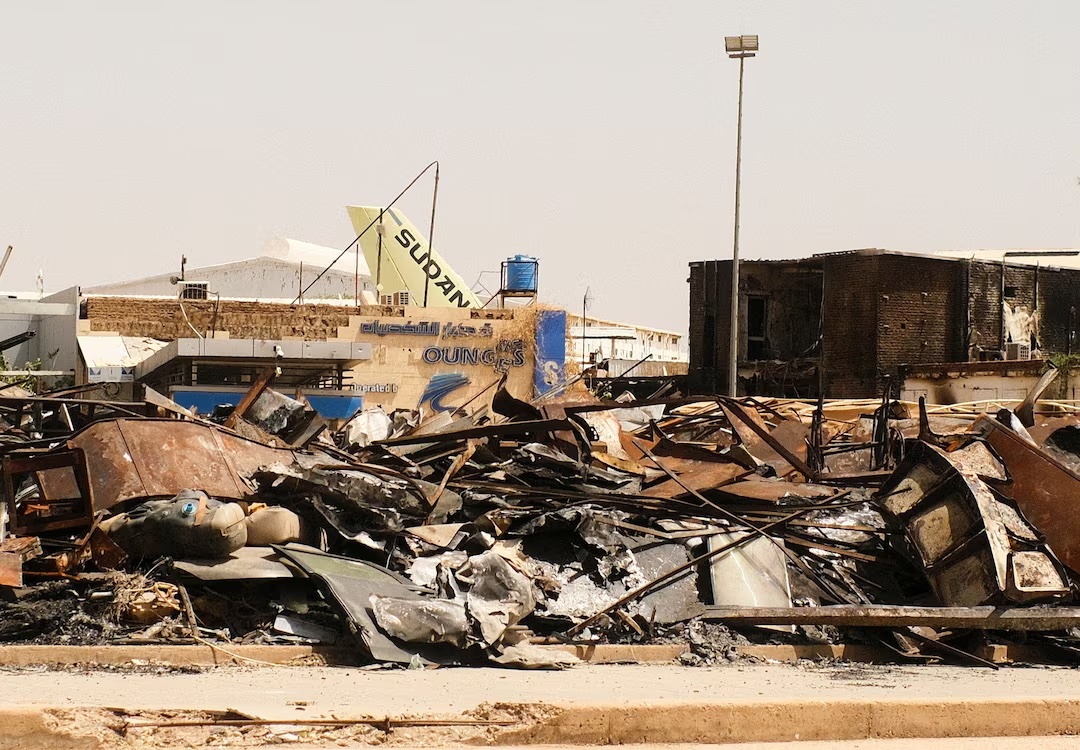
War in Sudan destroys infrastructure; expensive reconstruction is required
Blackouts, abandoned water stations, destroyed bridges, and robbed hospitals around Sudan are all evidence of the terrible toll that two years of conflict have taken on the country’s infrastructure.
Officials predict that reconstruction would cost hundreds of billions of dollars. In the immediate future, however, that seems unlikely due to ongoing combat and drone assaults on fuel stockpiles, dams, and power plants.
In addition, the globe is growing increasingly hostile to foreign aid, with the United States, the largest provider, cutting back on aid.
Since April 2023, the Sudanese army and paramilitary Rapid Support Forces (RSF) have been engaged in combat, resulting in tens of thousands of deaths or injuries and the displacement of approximately 13 million people in what aid organizations refer to as the biggest humanitarian disaster in history.
Residents of Khartoum, the capital, must put up with weeks of power outages, contaminated water, and congested medical facilities. Aircraft shells litter the runway of their burned-out airport.
Downtown Khartoum’s major buildings are mostly burned, and formerly affluent neighborhoods have been reduced to ghost towns with unexploded shells and wrecked cars littering the streets.
There is no way to live in Khartoum. “Even though the army has regained control, the war has destroyed our lives and our nation, and we feel homeless,” 56-year-old Tariq Ahmed remarked.
After the RSF was recently driven out of Khartoum by the army, he temporarily returned to his looted home in the city before departing once more.
One effect of the infrastructure failure is the quick cholera outbreak, which has killed 172 people out of 2,729 cases in the last week alone, mostly in Khartoum.
Fighting has also devastated other areas of central and western Sudan, particularly the Darfur region, while the widespread destruction in Khartoum, which was formerly the hub of service delivery, has an impact on the entire nation.
The reconstruction needs for Khartoum and the rest of Sudan are estimated by Sudanese officials to be $300 billion and $700 billion, respectively.
The United Nations is estimating on its own.
As the main al-Jaili oil refinery suffered $3 billion in battle-related damage, Sudan’s oil production has more than halved to 24,000 barrels per day, and its refining capabilities have ended, Oil and Energy Minister Mohieddine Naeem told Reuters.
He claimed that Sudan currently sells all of its crude and is dependent on imports due to a lack of refining capability. It also has difficulties in maintaining pipelines that South Sudan needs for its own exports.
Sudan blamed the UAE for an attack earlier this month that involved drones targeting the airport and petroleum facilities in the nation’s main port city. The claims were refuted by the Gulf nation.
Naeem claimed that all of the power plants in Khartoum had been destroyed. In addition to announcing a recent proposal to expand power from Egypt to northern Sudan, the national electrical utility stated earlier this year that it was having trouble maintaining the grid due to recurrent drone assaults on stations outside of Khartoum.
LOOKED COPPER
When government forces retook Khartoum earlier this year, one notable aspect was the discovery of precious copper wire through large holes dug into roadways and walls, which caused residents to return to homes that had been completely destroyed by looters.
A ditch, approximately 4 km (2.5 miles) long and 1 m (three feet) deep, has been cleared of wiring and shows signs of fire on Sudan’s Nile Street, which was formerly its busiest thoroughfare.
As RSF fighters looted equipment and used fuel oil to power cars, Khartoum’s two main water stations were shut down early in the war, according to official spokesperson Altayeb Saadeddine.
Individuals who have stayed in Khartoum are exposed to waterborne diseases as a result of drinking water from the Nile or abandoned wells. However, few hospitals have the necessary equipment to treat them.
The health sector has suffered losses of $11 billion as a result of “systematic sabotage by militias against hospitals, and the majority of medical equipment has been looted and what remains has been purposefully destroyed,” stated Health Minister Haitham Mohamed Ibrahim.
According to Luca Renda, a resident representative for the United Nations Development Programme, initiatives were necessary to prevent more humanitarian crises like the cholera outbreak, as two or three million people were considering returning to Khartoum.
However, a comprehensive reconstruction plan is not being developed due to the ongoing conflict and financial constraints.
“What we can do… with the capacity we have on the ground, is to look at smaller-scale infrastructure rehabilitation,” he said, referring to schools, hospitals, and water pumps that run on solar power.
He claimed that in this sense, the conflict might present a chance to pursue cleaner energy sources and decentralize services away from Khartoum.
All Categories
Recent Posts
Tags
+13162306000
zoneyetu@yahoo.com



